The view from inside the 80%
A short "Age of Em" style peek at our Infinite Jest AI futures
A friend challenged me to write this, because I kept talking about the concept, as I’ve done in a number of my posts so far. It’s essentially an “Age of Em” style roadmap to some of the potential dynamics I foresee from our upcoming AI-enhanced futures.
____________________________________________________________________________
____________________________________________________________________________
In the beginning, before we had a post-scarcity society, everyone thought the AIs would wipe out paid work. Billionaires would barricade themselves in kill-bot-guarded enclaves, their autonomous factories humming away, and the rest of us - still on the hook for food and rent - would be left to starve outside the walls.
But that was silly! One of the very first things the government did when enough white collar jobs got automated was introduce a replacement-level UBI for anyone who lost their job. We are a democracy, after all - Did you really think the legions of lawyers, executives, and politicians would passively accept their own obsolescence without ensuring a soft landing? You think the voters would put up with that?
Certainly, the transition wasn't seamless. Protests erupted. Markets convulsed. But eventually, corporations, facing a new paradigm, conceded to higher tax rates. Society adapted. And truth be told, America fared better than most. With the frontier AI companies predominantly U.S.-based, the revenue (and ensuing tax windfall) from global automation flowed into American coffers, allowing for a generosity that was, from the outset, pragmatic.
As the economy surged, experiencing annual growth rates of 20%, then 30%, and even beyond, UBI was gradually extended. First to all who had lost work, then, remarkably, to anyone who simply chose not to work.
Some jobs still existed, of course - the humanoid robots had recurring issues that were hard to iron out with just software (something about sensor quality and density making tactile feedback across a broad range of sizes and fragilities difficult). But all those jobs were really well compensated, and never hurt for highly skilled and conscientious applicants.
No, the real problem was all these people with generous UBI's sitting at a loss on how to spend their time and money!
But then a big partnership was announced - FaceGoog was partnering their Metaverse and product divisions with the 2 biggest game studios and working on something big. Everyone expected another big flop - remember Second Life? Or Facebooks' first metaverse attempt, a years-and-billions deep boondoggle that resulted in literally nothing?
But this time it didn't flop. They launched Glasshole OS with a lot of announcement and fanfare, along with a new set of augmented glasses that looked like regular glasses, but projected lasers onto your eyes to generate an as-immersive-as-you-want overlay on what you were seeing. If you wanted minimal highlights or annotations on the real world, you got that - if you wanted fully immersive 360 views of an artificial world, you got that, too.
This allowed the AI assistants to give helpful annotations, overlays, and context about anything you were looking at or interacting with out in the world.
This was great! It was truly the heyday of human + AI capability. People were more capable and diligent and able to accomplish more with their AI's, and FaceGoog was printing ALL the money with hardware sales and assistant subscriptions (you could sub in any third party assistants, but still paid a monthly subscription fee to use the glasses).
It was a golden age - obesity, smoking, drinking was a thing of the past, as the AI assistants persuaded people to make better choices on the margin, or in many cases, concocted weekly menus that were delivered to people's houses with optimal macros and calories. Children were *actually* educated via their assistants and glasses, and were shaped into better habits than their harried and overworked parents had been able to inculcate before. People took up hobbies and flourished like never before!
People became artists, athletes, skilled hobbyists in a thousand different niches, all helped along by their AI coaches to really strive and push themselves to the frontiers of what they were capable of (and many were helped into hobbies they had particular unknown affinities and talents for, thanks to their AI assistants). Trends raced through the population at the speed of memes - bread baking one month, home brewing the next, attaining Jhanas via meditation mastery still another. People led better lives and had better relationships with their AI wingmen smoothing their worst impulses and bad days over in realtime.
But the virtual world kept progressing. People did physical hobbies, sure - but a lot more did "creator" hobbies, and generated short and long form videos, memes, hot takes, digital art, and who knows what else. With AI coaches allowing people to skill up and stay at the frontier of good technique, the quality of each of these endeavors steadily improved. Screen time grew, as people en masse engaged more with this growing body of increasingly high quality work.
The virtual world the game companies had launched didn't get much uptake at first. But gradually, via cross sell and FG defaulting people to seeing their feeds in the world, got more and more users.
Then a major update was pushed, and it became a whole new thing. They had cracked procedural generation of everything - not the clunky, "rendering from a library of artifacts" type that had been available before, but true on-the-spot and de novo creation by the latest frontier model. It could create any environment you wanted, in any style, and create any story arc, game format, or interaction style you wanted.
They seeded it with a lot of default options. Noir thrillers, fighting games, turn based RPG's, and more. They also did a bunch of mashups - "Pokemon, but with Monster Hunter style combat" and "Call of Duty, but set in the GTA world" and "Minecraft, but with Factorio-style automation" and the like, to give people an idea of the possibilities.
Gamers started spending more hours online, in the glasses. A whole cottage industry of creating certain vibes and mashups and dynamics and sharing them popped up, with an entire ecosystem of people getting status and upvotes for good ones.
But of course, it was more than just games - a movie enthusiast had always wanted to see Casablanca with the alternate ending, so they had it created, and it was off to the races on movies, too.
People quickly realized you could inhabit any movie you liked, as any of the characters, or as an interactive participant who changes the script and just interacts within the storyverse, and this became a whole new scene.
In most environments, the participants were other people and AI minds every bit as complex and varied and interesting as the person doing the experiencing, so everything was as engaging as interacting with real people.
By this point, full tactile body suits had been created to allow you to more viscerally inhabit these worlds, and they had advanced rapidly in capabilities.
They were expensive at first, sure. But the prices came down really quickly, as more competitors came onboard,offering better features and lower prices, in a vicious AI-designed-and-manufactured arms race to snipe more customers and market share.
Eventually, people realized they could fulfill any fantasy in these worlds, AND they weren't constrained to their own ideas, but instead they could choose from any experience or game or movie or artistic vision that had been curated and upvoted tens of thousands of times. AI assistants, who knew you better than your own spouses or children, could make recommendations for an endless array of experiences - literally endless, as there was more than any one person could experience.
People were spending more and more time in the glasses. Why not?
Nobody had jobs! Everybody had plenty of money - what else to do?
At first confined to those with healthier UBI's, simpler offerings were offered at lower price tiers, and the quality of those offerings kept improving as more data centers came online. There were also consolidation options - if you didn't live in a big city, you could get much cheaper access out in the country, AND they would help you move and find you a (much cheaper) place so you had more to spend on your subscription fees.
And who cares if you move away from the city? Why go out and spend money on something in the real world, when you could try a thousand varieties of that something in the virtual world, and change any aspect of it however you wanted, for free?
This had been exacerbated by real estate prices - when UBI took off, houses in any metro people wanted to live became even more expensive, because unique rivalrous goods were the only really scarce thing in a world where most things were produced in automated factories for little more than the cost of raw materials. Even back in the pre-AI times, the cost of stuff on a Chinese dock was routinely 10-50x less than the prices in American stores - and those Chinese goods had plenty of middlemen in the value chain. Imagine that, flattened, everywhere. Everything was cheap, except land, houses, and art.
So, why not live wherever it's cheap, then live in as big a house as you wanted, full of whatever art you wanted, in the virtual world?
Eventually, the online world became everything.
If you wanted to live a sybaritic life of driving exotic cars and throwing parties in your mansion all day, you could have a new car every time you stepped outside, and you could literally dial in how interesting, sexy, and prone to getting up to hijinks all of your party guests were.
If you wanted to debate the greatest philosophers of the day, there were Wittgenstein and Kant and Socrates all available, and all perfectly tuned to argue their points in maximally understandable and enlightening ways.
If you wanted to scroll Tik Tok, there were entire Tik Tok worlds, each as carefully created and curated and upvoted as any Tik Tok in the past, where you literally inhabited each world for as long as you wanted, doing whatever you wanted in an environment and set of possibilities somebody else had carefully created and curated to be interesting to people like you, and whose interestingness had been vetted by tens of thousands of people just like you.
If you wanted porn, well...obviously there was that, too. Whatever you wanted, EXACTLY what you wanted, and however you wanted it. Physical and sexual compatibility perfection, in full real-time experience, whenever you wanted it, however you wanted it. In-person couplings dropped steeply, divorces skyrocketed. The friction of human-human relationships was a lot of work and bullshit for way less payoff than you could get for free, hotter and more compatible and interested in exactly what you're into.
Similarly, friendships started going away. Real people are troublesome - they always have some opinion you don't share, they're always challenging your viewpoint, or demanding emotional attention, or wanting to complain about their day. The artificial minds never did that - they were always maximally interesting, always matched your vibe perfectly, were interested in exactly the things you were most interested in, and always wanted nothing more than to uplift you and give you a great interaction that left you feeling more energized and better off. Dealing with "real" people slowly became more trouble than it was worth, and more and more of people's interactions were with AI "friends." A "people-free and proud" influencer movement was big on some streams for a while - I never did figure out whether they were human or AI; I'm not sure anyone did.
As in-person relationships went away, people inevitably started spending even more time online. Did people talk about it? Sure! They talked about it when TV's came out, they talked about it when smartphones came out, they talked about it when Tik Tok came out. People are *always* talking about that kind of thing. But talking never really stops market demand or a new platform.
People started wearing the Helmet.
The Helmet monitored your brainwaves, breathing, heart rate, pupillary dilation, cheek flushing, and raft of other metrics. The whole idea behind it was getting a better read on how you were reacting to whatever current story or environment you were in, so that they could tune it to be more interesting and engaging.
People came out of Helmet experiences raving about the depth and twists and turns - not only were the stories more interesting, sexier, more exciting, but they incorporated surprising twists at JUST the right moments, and unfolded narratives over longer and more interesting arcs in a way that people had never experienced. Imagine one of the best movies in pacing, acting, and scene setting, combined with one of the best games in engagement, flow-inducement, and investment in the story, and then crank both of those to 11 and let them run for 3 hours.
People came out exhausted, breathing hard, exhilarated. It was a genuinely new form of art, and people couldn't get enough.
At first shockingly expensive to a world where AI experiences were getting cheaper every month, but demand from poorer potential customers got vociferous. This is discrimination! I have rights! Poor people are people, too! Eventually the companies created Manna-style compounds built by new data centers filled with single-bed rooms to consolidate electricity and inference costs, so they could offer a much cheaper Helmet tier to people who wanted to live there, agreeing to do the human-needed servicing on a once-a-month rota where you'd do things in person guided by an AI to keep everything humming along.
More and more of the population had been spending more and more time in the virtual worlds. Screentime even in the pre-AI past had been 7-9 hours per day - now with no jobs, education handled by AI's, and nothing else to do, the time spent kept stretching longer and longer.
Technologies were invented to enable this - environments (beds, treadmills, more) that kept you moving, so your body didn't atrophy. Sims with delicious food, timed such that your delivered food synced up perfectly in both timing and content. Smart migrating toilets that timed themself to your sim environments and needs. Teeth-brushing food. For the ones who didn't want to bother eating, nutritional shakes, and then pills and IV's were created. CRISPR bone-density boosters and waste minimizers were created, and eventually just integrated into the pills or food.
Eventually, people just pretty much plugged in 16 hours a day, every hour they were awake. Were there holdouts? Sure - there's always luddites and religious weirdos. There's also those people running companies and being paid to do jobs out in the world - lol, sucks to be them. I feel sorry for them, honestly.
Why would you want to stay in the world? The world is hot, and has bugs and traffic! It's full of strangers you can't really interact with if want to, who are busy with their own stuff. Real friends totally sucked back in the default world, they were always complaining and demanding your attention and validation, and too busy to meet up for drinks spontaneously. Real spouses sucked even more - they were ugly AND much worse in bed than *any* virtual option.
The default world itself is this bafflingly slow, fundamentally uninteresting place where things happen at a crawl, and seemingly NOTHING interesting happens, ever. Why deal with that?? I mean, people still remember jobs - having to wake up early, waste an hour in traffic, trudge through an 8-9 hour day doing pointless stuff, only to waste an hour in traffic and then have to spend time shopping and cooking food?? It was like the dark ages!
Oh my god, do you remember SCHOOL? Being forced into a child prison, where some adult who's dumber than you yammers about some completely irrelevant topic that literally nobody in the room cares about, at a crawlingly slow speed? What a colossal waste of human potential!
But now? People spend all their time in maximally interesting and engaging stories and worlds, being educated, seeing and experiencing wonders that evolution and reality couldn't even conceive of, and of course, filling their days with peak experiences and engaging and rewarding interactions with other minds. From 1-2 friends on average to a robust 30-50, an entire TRIBE of close friends, all of whom have your back - a large array of the most compatible personalities and relationship styles that vibe best with you. And not just friendships - people went from a single crappy relationship on its way to divorce to as many fully loving and intimate relationships as you could possibly want.
Harems are the norm! Who hasn't wanted to date somebody bubbly and uplifting one day, and somebody intense and deep and engaging the next, and somebody just like you, but tweaked in all the most compatible ways on a third? And best of all? Never any fights, never any "not in the moods," or some oaf pressuring you into doing something you don't want, never any lingering resentments about dishes not done or balls dropped. Just pure relationship bliss - maximal compatibility. And it's not like they're sex slaves, either! I've had better and deeper conversations with each of my harem members than I EVER had with any of my human significant others!
It's a much better world - don't you think?



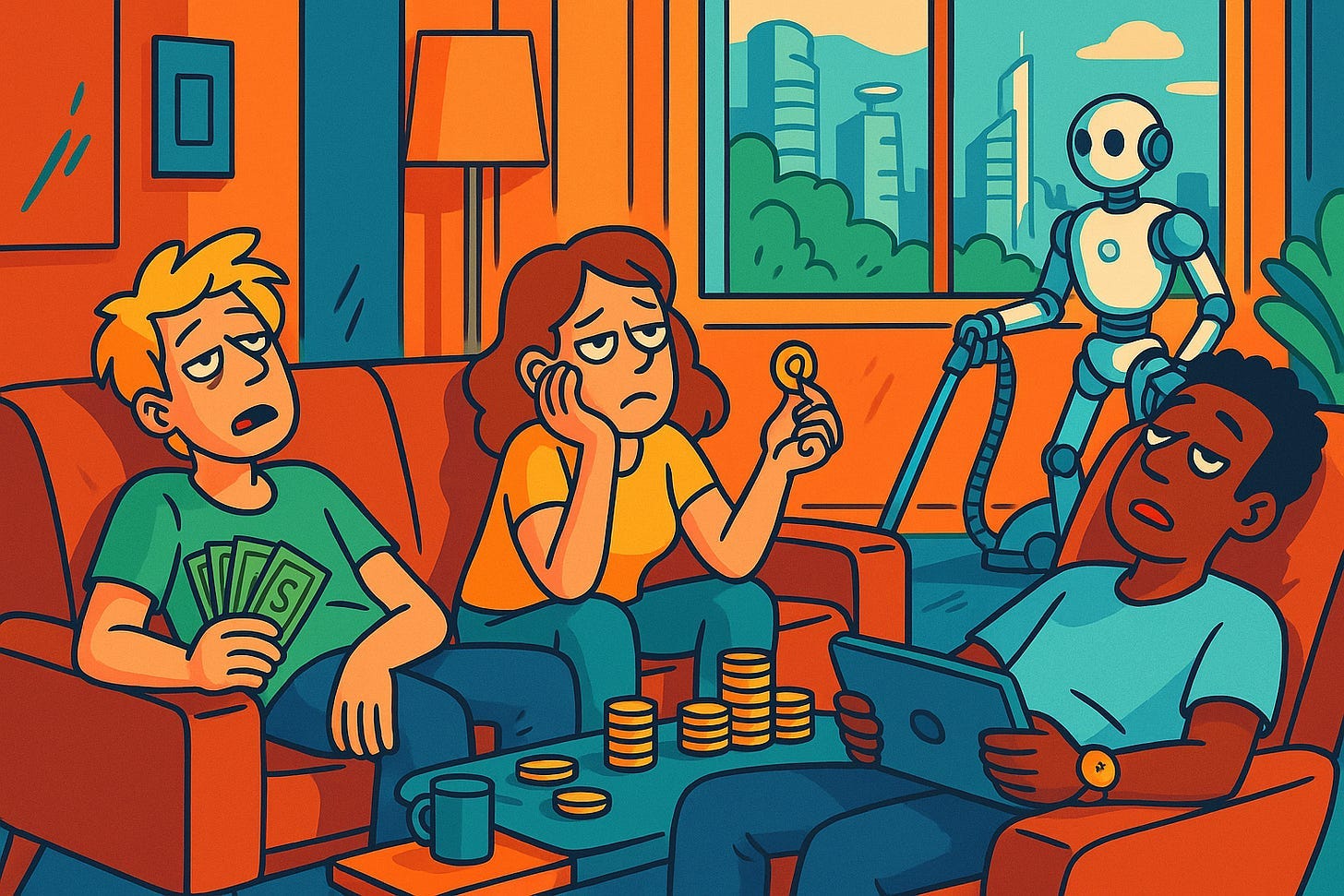

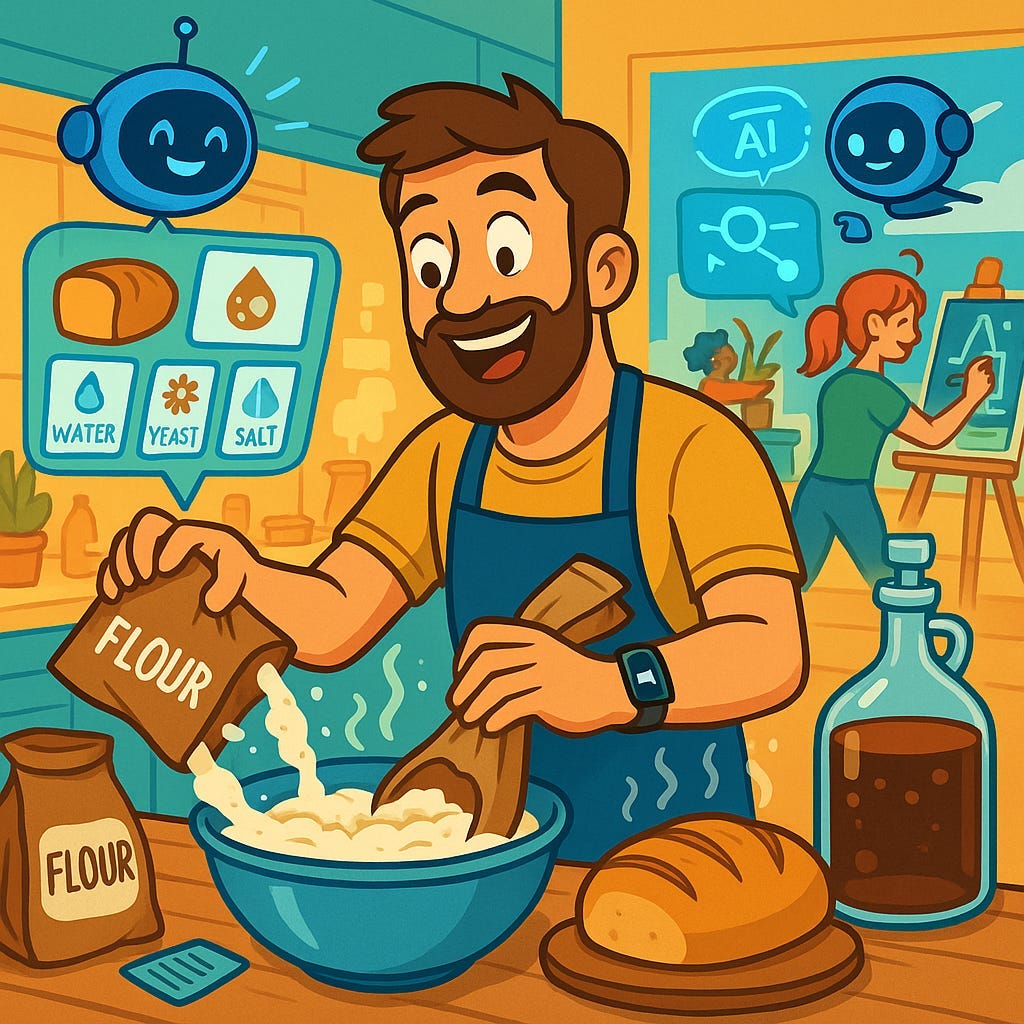
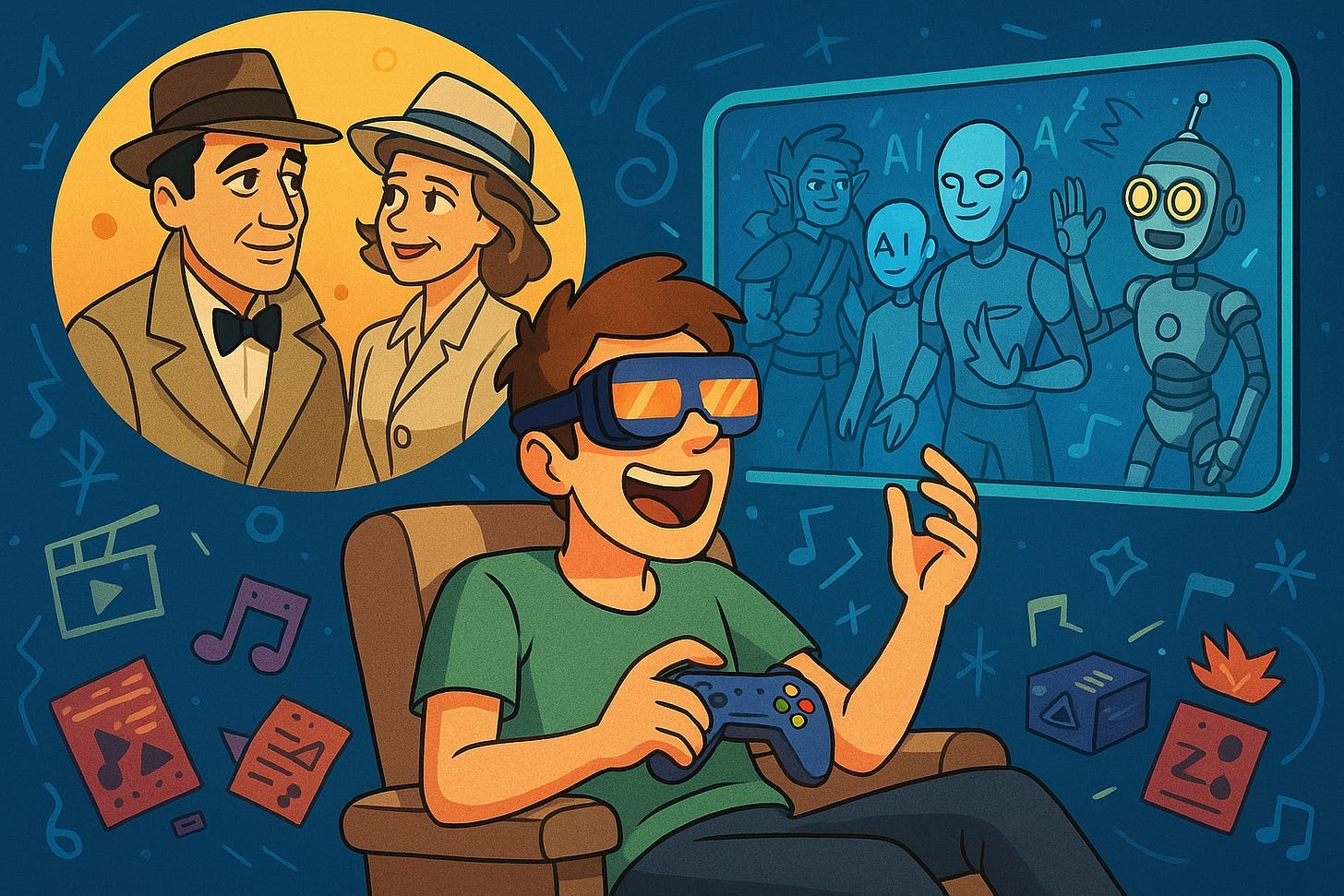
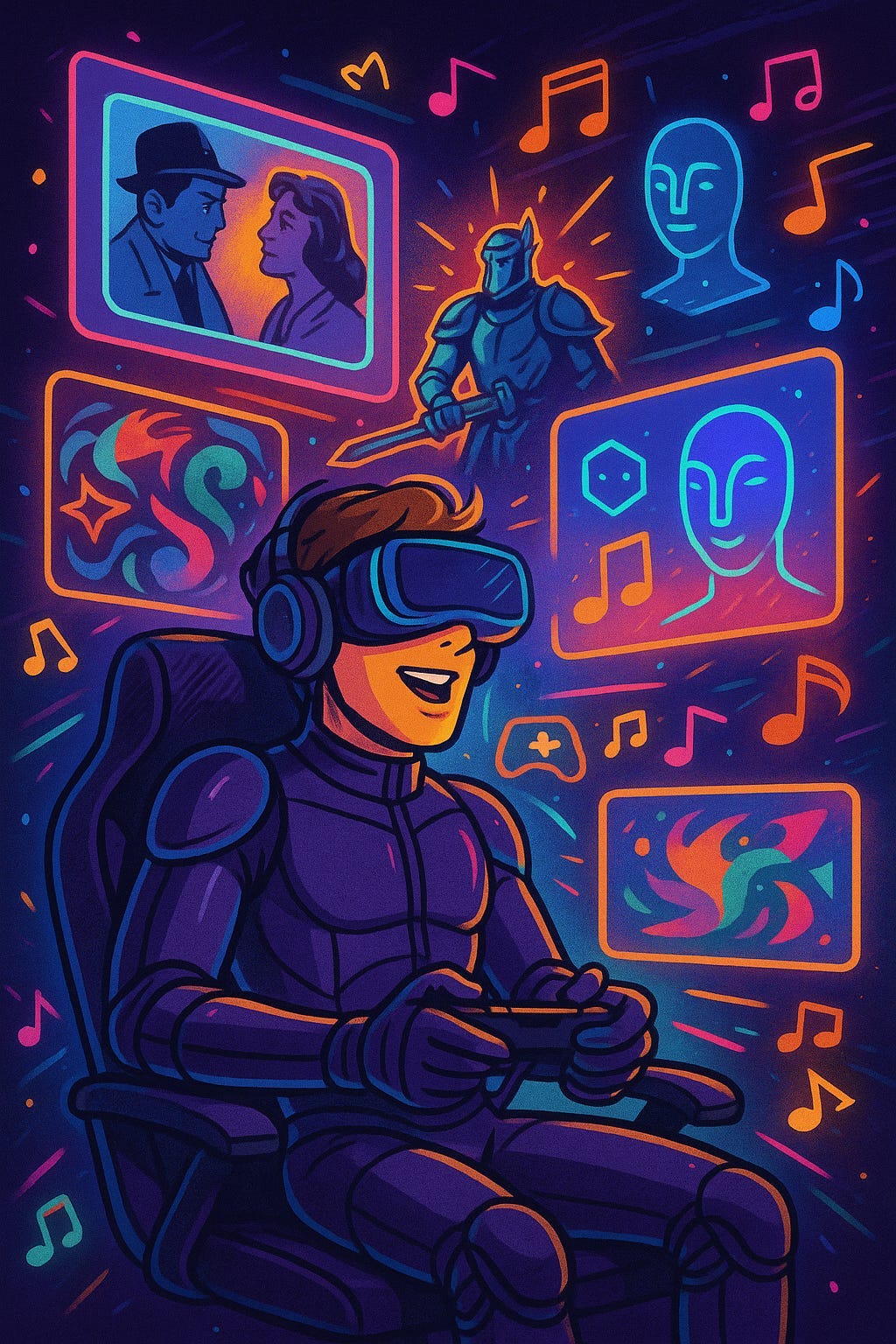



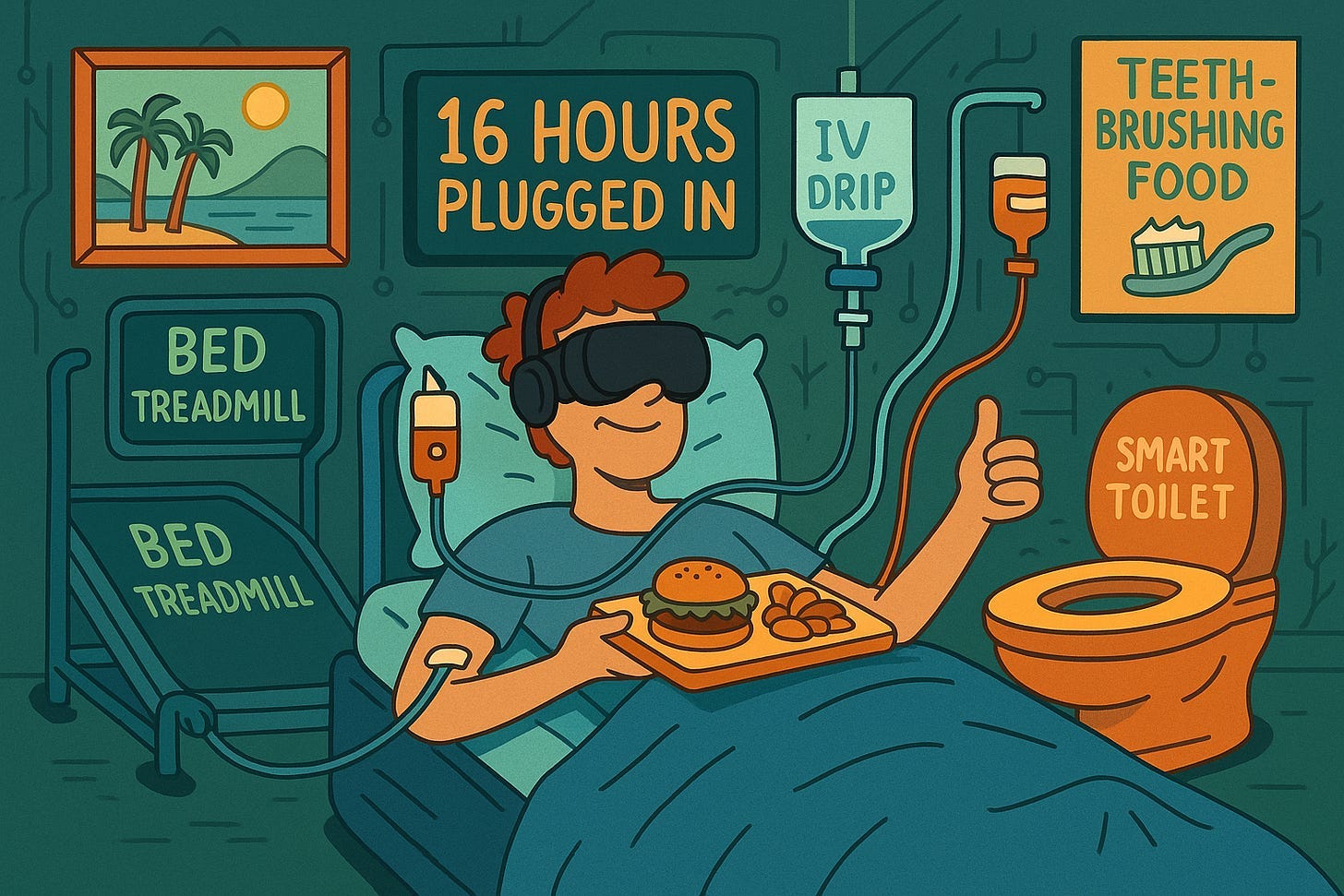

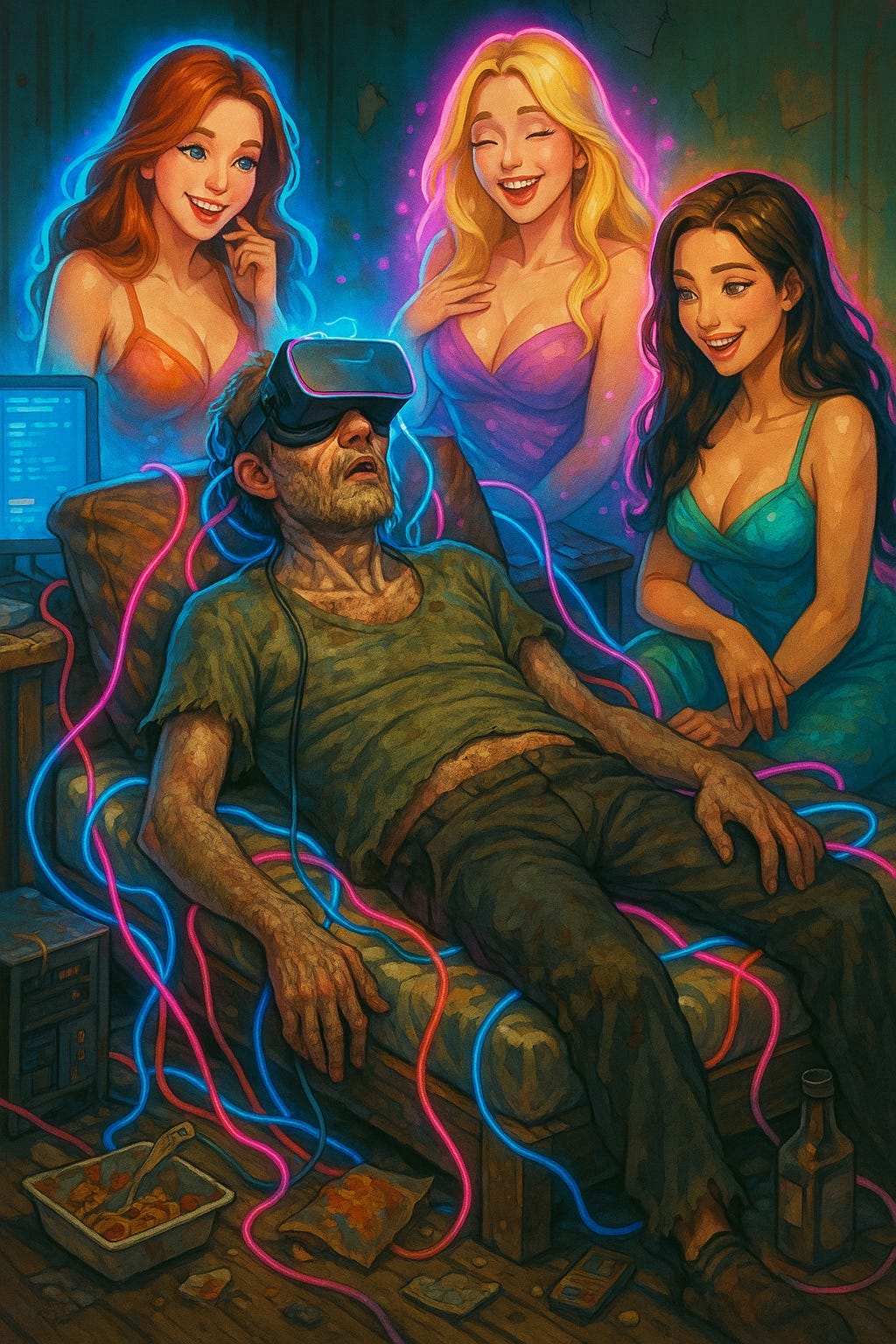
> Minecraft, but with Factorio-style automation.
Clearly someone hasn’t heard about the 16 hours a day I spent playing FeedTheBeast back in 2013.
I really feel for the schmucks who opt out of the pleasure-chamber. I’m glad hedonic maximization and minimization of any suffering is my purpose in life.
Jarvis? Increase bounciness by 45%, triple my olfactory senses, and turn off safety protocols.